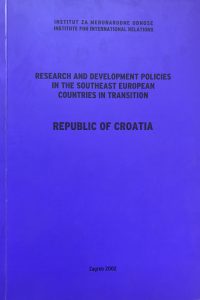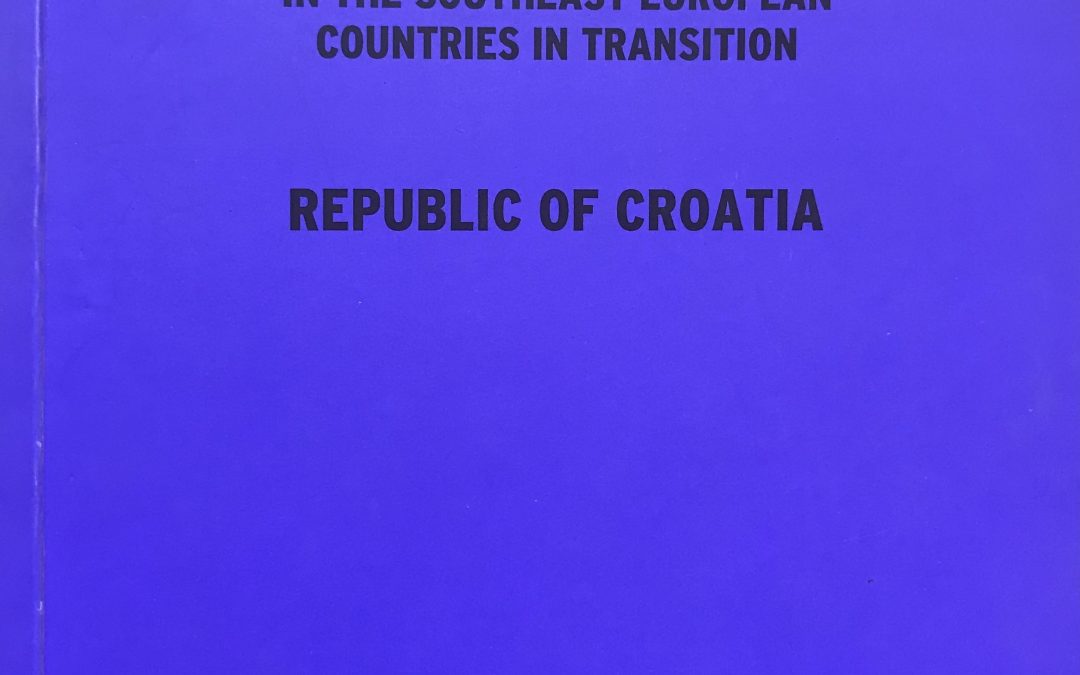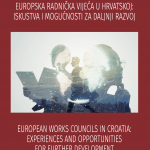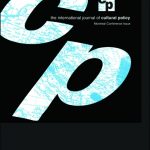
Authors: Gvozden Flego, Sibila Jelaska, Boris Kamenar, Velimir Pravdić, Katarina Prpić, Vlatko Silobrčić, Dionis Sunko, Nada Švob-Đokić
Publisher: IRMO
Year: 2002
ISBN 953-6096-28-5
Introductory Note
The present study on Research and Development Policies in the Southeast European Countries in Transition: Republic of Croatia has been prepared within the framework of UNESCO’s programme of participation in the activities of the member states, based on the proposal made by the Croatian Commission for UNESCO. The coordination of work on this study has been entrusted to the Institute for International Relations in Zagreb, whose academic council appointed Dr. Nada Švob Đokić, Senior Adviser, to direct the project. Among the objectives of this study, mention ought to be made of the intention to analyze the possibility of a successful development of science, research and development in a newly emergent European post-socialist state, such as Croatia; another objective has been to analyse the impact of transition and social transformation on research and development, the highly specialized and professional activity. We offer a survey of the main research and development policy guidelines for the period 1990 to 2000. Research and development policy is understood as a systematized integral whole consisting of objectives, methods, organizational forms, modes of action and the scientific results achieved in the context of a democratic social development. The present survey of Croatia’s research and development policies in the last decade of the twentieth century covers some elementary conceptual issues of scientific development and structure and functioning of the scientific system. The following topics have been covered: legislative and institutional framework for the management of scientific work (Professor Gvozden Flego, Ph.D.), financing (Professor Sibila Jelaska, Ph.D., Fellow CASA, Croatian Academy of Sciences and Arts), personnel (Katarina Prpić, Ph.D.), the position of research and development organizations (Velimir Pravdić, Ph.D., Fellow CASA), production and productivity in research and development (Professor Vlatko Silobrčić, Ph.D., Fellow CASA), specialization in research and scientific communication (Nada Švob Đokić, Ph.D.), and international cooperation (Professor Boris Kamenar, Ph.D., Fellow CASA and Professor Dionis Sunko, Ph.D., Fellow CASA). The introduction to this study and its conclusions, written by the project director, represent an attempt to systematize the views, attitudes and issues regarding the position of science in Croatia as seen by the authors in their specialized contributions. Among the many problems that the authors of this study faced, the problem of terminology deserves to be mentioned. The usual Science and Technology (S&T) versus Research and Development (R&D) distinction reflects ambiguities and difficulties in defining precisely the field of our analysis. S&T refers to the state-supported activities that preserve traditional scholarly and theoretical interests and orientations. R&D stands for the dominance of applied knowledge production and reflects private and company interests, as well as the domination of private investment in research. In the post-socialist countries, the relationships between these two basic orientations of research activity remain varied and not precisely defined. The same structural problem reappears in the use of other terms as well: researchers, scientists, scholars, etc. Possible terminological imprecisions are due not to the lack of effort to standardize the terminology, but rather to its semantic non-transparency. The study is intended for the international and domestic professional and scientific public. It provides information on the social position and development of science in Croatia and will serve as a useful source in further work on the planning and programming of research and development in that country. The authors gratefully acknowledge the help of their colleagues who provided information, data and comments on an earlier draft of this text. Our thanks are due also to the State Statistical Bureau and the Ministry of Science and Technology of the Republic of Croatia, which put their data at our disposal.
The Editor
Main Findings and Conclusions
The introduction to this study outlined the international and transitional context within which the science policy of Croatia was formulated and conducted. It was shown that the formulation of a science policy was a relatively new developmental experience, which was particularly evident in the first National Research and Development Programme. The scientific policy remained in the shadow of unsolved questions of principle and in a situation in which the social and developmental role of science was not sufficiently appreciated. That is why science was exposed not only to the objective problems of transition and restructuring of the entire research and development field, but equally to ill-thought out, often arbitrary decisions and solutions, many of which were counterproductive. Each section of the present study which analyses the functioning of a segment of research and development work offers conclusions that cover specific fields and particular issues. Without going back to look at each field of research and scientific policy in Croatia in the last decade of the twentieth century, we would at his point like to highlight the following conclusions:
(a) The absence of a clearly formulated, coordinated and publicly proclaimed science policy in Croatia reflects the fact that the position of science in Croatian society and its development is not clearly defined. Lip service is paid to the social significance and achievements of science, but its true role is not recognized.
(b) The lack of a clear science policy is responsible for the continuous marginalization of research and development work. Irrespective of the principles and priorities that it might follow and of the political positions that it might take, any government should be capable of formulating its objectives in research and development and specifying the means by which it intends to achieve them. The science policy must be public and open to public criticism, because it is only in this way that a social perception of science can emerge as a key element of social and overall development of Croatia.
(c) The analysis of the research and development work and of the system of science, technology and higher education should contribute to the overall democratic social change. The public should gradually assume the right to influence the development of science and the use of research results. This, in turn, goes hand in hand with political democracy and economic prosperity. Restrictive approaches to research and development work, which were predominant in the last decade of the twentieth century, should be abandoned. They manifested themselves in the authoritarian management of science and in attempts to pose unsuitable, frequently arbitrary, norms as a framework for the evaluation of research and development. Such norms constrain research work and pretend to bring it up to international standards, which they frequently fail to deliver.
(d) The present excessive and often inappropriate norm setting for research and development needs to be re-evaluated and balanced. Developments during the last ten years of the twentieth century clearly showed that state management of science favoured formalized, bureaucratic approach to its functioning, and imposed upon science the respect for day-to-day political concerns rather than norms suitable for science. Such a situation is counterproductive, especially at the time of opening of science towards production, technological progress and higher education, as well as towards the public. Scientific work should stimulate the acceptance of innovativeness as a fundamental quality of society, environment preservation and life as such.
(e) The financing of science is at present far from being stimulating and developmental. It has been shown that Croatia not only fell out of step with small developed countries in the European Union, but also with the group of countries in transition. We can therefore confidently claim that funds for research and development should be significantly increased. At the same time, it should be recognized that the manner of financing, that is, the accumulation and allocation of funds, was very unsatisfactory. The main source of funding is the state budget, and the allocation of funds is fully regulated by the Ministry of Science and Technology. The system of allocation is inadequate, non-selective, and unstimulating. Also, it is liable to subjective, arbitrary political and even personal preferences. The consequences of such practice are intolerable, with negative repercussions for the development of science. The sources of financing should be diversified as quickly as possible.
(f) The personnel situation in the Croatian research and development system is almost tragic. The number of employees in this system has been cut in half in the course of the last ten years, while the number of researchers has declined by more than 24 per cent in the past decade. In many fields, the critical mass of researchers has evaporated, while some other fields record a dramatic aging of the research personnel. The rejuvenation programmes in science, that is, employment of trainees, have failed to produce the expected results. The recently appointed researchers (PhDs) are not given an opportunity to pursue their scientific careers, or, at best, they must fight all kinds of complicated restrictions. The gradual feminization of science is an expression of the declining material situation and social marginalization of this sector. Restrictive models of management of science cannot secure the rejuvenation or rapid growth in the number of high quality researchers. Thus, scientific competitiveness, critique, and openness are lost at the expense of scientific paternalism, which slows down the dynamics of development in science. Given such reasons, it is important to stimulate personnel growth and rejuvenation in science generally, and in the corporate and non-state sector in particular, where optimum results can be achieved through the application of knowledge and dedicated work of interested young researchers.
(g) The research and development organizations, primarily the universities and institutes, reflect the organizational dichotomy in Croatian science (the Anglo-Saxon vs. the Humboldtian model). Croatia’s science policy has totally ignored these systemic and organizational issues and failed to promote new organizational models which might be more suitable for this country. Organization modelling is particularly important for the reform of the Croatian universities, but has nevertheless remained in the margins, contributing nothing to the promotion and development of science. The organizational neglect has reflected itself in the retardation of teaching and research work, acting as an obstacle to more intensive and more productive scientific communication and exchange.
(h) Evaluation of research work is made quite difficult, or impossible, because of the failure to adopt internationally comparable rules for the gathering and processing of data on research and development. This crucial defect opens the door for many ill-founded and arbitrary assessments of research and development work, with all the negative consequences for science – from research specialization and organization of science to the social position of scientists.
(i) As for the disciplinary and specialist division of science in Croatia, it should be said that it is formally harmonized with international standards and generally adopted divisions. However, the real situation in Croatia reflects a radical departure from such standards. There are strong tendencies to full despecialization or the cultivation and promotion of different specialist areas according to the momentary interests of smaller groups of scientists. Such tendencies might otherwise be stimulative in interdisciplinary and multidisciplinary work, or in the introduction of new “nesses” (new and emerging scientific specializations), as an expression of a dynamic growth of science. In Croatia, unfortunately, the processes at work are different, promoting momentary political or personal interests through the so-called “priorities”. That is why issues dealing with specialist divisions and critical standards for their establishment and maintenance should be treated in a flexible manner. Opportunities should be provided for research in new specialist fields, with redefined standards to get rid of the rigid specializations and divisions, and definitively recognize and support the multidisciplinary and interdisciplinary nature of science. Bureaucratic standards should not be allowed to prevail over the requirements of science itself.
(j) Scientific communication has unfortunately not been the subject of special research, nor has it been an element of a more or less well defined science policy. At this moment we can only say that intradisciplinary communication and communication of scientists with the public are extremely important for the development of science, and should be given due weight. Science policy should pay attention to the popularization of science and stimulate public engagement in the application and use of knowledge in all fields.
(k) Official international and scientific cooperation is fully controlled by the Ministry of Science and Technology. Although Croatia has signed agreements on scientific and technical cooperation with 39 countries, actual cooperation takes place with just a few partners. In 2001, only 1.44 % of the Ministry’s budget was available for international cooperation. Still, the actual scientific cooperation is more rich and varied. It is practised by all Croatian universities and almost all public institutes. However, insights into the practical materialization of cooperation and evaluation of projects and programmes are patchy. Although it is assumed that at least thirty per cent of all research and development activities take place within the international scientific cooperation and communication schemes, the figure is not transparent and is impossible to verify. It is important, therefore, to make international cooperation transparent and visible in Croatian science and in the Croatian public and to evaluate its overall developmental impact on research and development.
Finally, it should be stressed once again that Croatia needs to define its own science policy, that this policy should be presented to the public, that it should be implemented, and that institutional mechanisms for its evaluation should be developed.
DOWNLOADS
This publication is available in elektronic format: Research and Development Policies in the Southeast European Countries in Transition: Republic of Croatia




